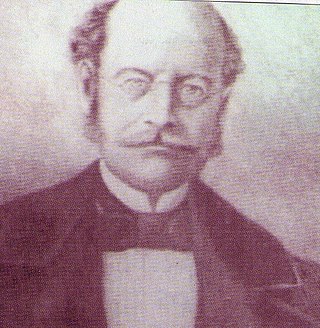Hungarian Uruguayans
Ethnic group From Wikipedia, the free encyclopedia
Hungarian Uruguayans (Hungarian: Uruguayi magyarok) are people born in Hungary who live in Uruguay or Uruguayan-born people of Hungarian descent.
 Hungarian composer Debály Ferenc József (Francisco José Debali), author of the music of the National Anthem of Uruguay | |
| Total population | |
|---|---|
| 3,000[1] | |
| Languages | |
| Uruguayan Spanish, Hungarian | |
| Religion | |
| Christianity (mostly Roman Catholic and Protestant), Judaism | |
| Related ethnic groups | |
| Hungarian people, Hungarian diaspora |
Overview
Hungarian Uruguayans are a local ethnic minority; their presence is small but meaningful, numbering around 2,000-3,000 of which ca. 150 were born in Hungary.[2]
In 1925 was established a Society of Hungarian-Language Workers in Uruguay[3] They even had some influence within the Communist Party of Uruguay.[3]
In 1936, Hungarian migrants established the Hungarian Home of Uruguay (Hungarian: Uruguayi Magyar Otthon), an ethnic association.[4]
There is also a small Jewish-Hungarian community,[5] they established their own association in the 1920s,[6] which in turn sent their representative to the Uruguayan Central Israeli Committee.[7]
There is an immigrant branch of the Batthyány noble family.[8][9]
Notable Hungarians in Uruguay
- Past
- Francisco José Debali (1791-1859), composer of the National Anthem of Uruguay[10]
- Carlos Végh Garzón (1902–1984), politician, Minister of Finance
- Alejandro Végh Villegas (1928-2017), economist, Minister of Economics and Finance
- Present
- Carlos Batthyány (born 1969), scientist, director of the local Institut Pasteur[9]
- Déborah Gyurcsek (born 1978), female track and field athlete
- Adrian R. Krainer, biochemist and molecular geneticist
- Jorge Polgar (born 1967), economist
- Krisztián Vadócz (born 1985), professional footballer
- Carlos A. Vegh (born 1958), economist
See also
References
External links
Wikiwand - on
Seamless Wikipedia browsing. On steroids.
